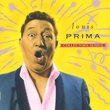| All Artists: Basil Poledouris Title: Quigley Down Under: Original Motion Picture Soundtrack Members Wishing: 2 Total Copies: 0 Label: Intrada Records Original Release Date: 10/19/1990 Re-Release Date: 11/17/1992 Album Type: Soundtrack Genres: Pop, Soundtracks Style: Number of Discs: 1 SwapaCD Credits: 1 UPC: 720258700629 |
Search - Basil Poledouris :: Quigley Down Under: Original Motion Picture Soundtrack
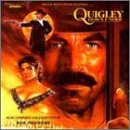 | Basil Poledouris Quigley Down Under: Original Motion Picture Soundtrack Genres: Pop, Soundtracks
|
Larger Image |
CD DetailsSimilar CDs
Similarly Requested CDs
|
CD ReviewsTom Selleck's best ever Chrijeff | Scranton, PA | 02/05/2003 (5 out of 5 stars) "Like many TV actors, "Quigley"'s star Tom Selleck gave much attention, during and after his small-screen career, to attempting to break into movies. If he'd been born in 1926, instead of 1946, he would probably have gained fame, not as Thomas Magnum, but in Western films and/or TV series like this one. Quigley is the role he was born to play, and in Quigley's adventures he has made, to my mind, the best movie of his career.This slam-bang actioner, though often labelled a "Western," actually takes place, not in the American West, but in the Crown Colony of Western Australia, probably around 1875 (there are still convicts there). Selleck plays Matthew Quigley, a soft-spoken marksman from Wyoming, who answers an advertisement by Australian rancher Marston (Alan Rickman) for "the finest long-distance marksman in the world." After three months on a sailing ship, he steps ashore at the port of Fremantle, where he promptly gets into a brawl with what turn out to be three of Marston's men, come to meet him, and is mistaken by displaced "native-born Texian" Crazy Cora Cobb (Laura San Giacomo) for her husband Roy. At Marston Water he offers a display of his skill with his primary weapon, a customized Sharps .45 buffalo gun, and impresses everyone, including Marston, who describes himself as "a student of your American West" and is a fast draw, pinpoint-accurate, and quietly proud of it. Only now does Quigley find out that he was being hired, not to kill dingoes (Australian wild dogs) as he thought, but to clear Marston's lands of the native Aboriginies. He promptly throws Marston out the French window of his own house, but is eventually overwhelmed by Marston's crew and, with Cora, taken out to the desert to die. Managing to kill the two men who fetched them there, he recovers his rifle and big Stetson, but loses the buckboard and horses. Trying to walk out, he and Cora are found by a clan of Aboriginies, who take them in, and when a group of Marston's men appears to hunt the natives down, Quigley takes up his Sharps in their defense. Eventually he eliminates Marston and all but three of his men in a sort of one-man "long hunt," climaxed by a shootout in which, though wounded and battered and admitting that he "never had much use" for handguns (he doesn't even carry one), he kills three men so fast that his shots sound like one.Though there's a good deal of violence in this video--in fact, it will probably be too intense for kids under the age of 12 or so--none of it is gratuitous: each instance either serves to further the story in some way or is portrayed as an inevitable result of the choices and character of the person acting or being acted against. Selleck's Quigley is a '90's version of the classic John Wayne hero: soft-spoken, quietly competent, modest and unassuming (he "spent a night" in Dodge City once, and describes it as "a nice place to get some sleep"), chivalrous toward women and even a little unsure of how to react to them. (His early interactions with San Giacomo's Cora, on the Fremantle docks and in their first outback camp, add a whimsical touch to the movie's tone and should draw laughs from all watchers.) He also has an iron code of behavior, and he doesn't hesitate to learn even from the primitive Aborigines: one of the most delightful sequences finds them teaching him to use a spear-thrower and to suck water out of the sand through a bamboo--after which he repays them by conducting a class in the making and proper use of a rawhide lasso. Rickman is the kind of villain you love to hate: smooth, silky, sneering, yet acting from what seem to him to be completely valid reasons. San Giacomo may be "touched in the head," but she's also earthy, practical, and fiercely loyal to Selleck and to the orphaned Aboriginie baby they find; her story of how she came to be in Australia is touchingly delivered.And, like most of the best movies, "Quigley" can serve as a starting point for some penetrating family discussion. Parallels will quickly be seen between the Aborigines' situation and, not only the experiences of the American Indian, but the "ethnic cleansing" through which the former Yugoslavia suffered, and which kids may have studied in school. Quigley seems not to be revengeful against Marston and his crew of 20-odd tough English and Irish until they act against the Aborigines who have been his and Cora's friends, and even then a case can be made for his killing as many of them as he can hit: afoot and outnumbered, he doesn't want them in the area and angry at him; after the second Aboriginie drive and the accidental killing of a storekeeper's wife, he is simply resolved to keep them from doing any more harm.Though action is the movie's keynote, it is above all the story of how three people inspire one another to certain inevitable acts--in short, like all the best stories, it turns on character. And its characters will remain in the memory for a long time to come. (A side-benefit is the blood-stirring score by Basil Poledouris, which was one of the first CD's I ever purchased.) The cinematography gives a powerful sense of the size and loneliness of the Australian outback (filming was done in Alice Springs and other Australian locations), as well as of how important it is that Quigley seems far better able to adjust himself to it than Marston's men are willing to do. Director Simon Wincer, though not of American birth, has turned out a movie which, while not strictly a "real" Western, should become a classic of the genre. By my criteria, it's definitely a 10--or perhaps even a 12." The American Wild West Meets The Aboriginal Dreamtime Brian E. Erland | Brea, CA - USA | 07/21/2005 (5 out of 5 stars) "An American sharpshooter (Tom Selleck) with a powerful, experimental rifle takes to the high seas in the late 1800's and sails across the Pacific Ocean to Australia. His name is Matthew Quigley and he has been hired by Elliot Marston (Alan Rickman) to rid the wealthy landowner down under of the numerous packs of dingos (wild dogs) attacking his livestock. At Least that's what Quigley thinks he's being hired to do. Shortly after arriving on this foreign shore Quigley learns the horrible truth about his assignment. The cruel and despotic Marston doesn't like Aborgines wandering through across his land and has decided to solve the problem by exterminating them. Quigley has been hired to carry out the job. His refusal to take the job marks the beginning of an epic battle between Marston and his men against Quigley as he fights to defend the indigenous population. Action/Adventure in its truest tradition, with the lines clearly drawn between the forces of good and evil. You will find yourself rooting out loud for the "good guy" before the movie is through! Along with the typical action sequences you expect to find in a good Western, there are also plenty of poignant and sad moments which center around both the plight of the aboriginal culture and the personal tragedy shared by Crazy Cora with Quigley in one of the most tender moments of the movie. Great performances by all. Tom Selleck was born to play this role and anyone familiar with Alan Rickman knows that nobody is better at playing the "bad guy" than he is. And let's not forget Laura San Giacomo as Crazy Cora who supplies both the comic relief and eventual love interest of Matthew Quigley. This was a tremendously original concept for a film which was carried out to perfection. This is not only one of my favorite Westerns, but one of my all-time favorite films." Good old fashoned western W. Priebe | Houston, TX USA | 12/31/1999 (4 out of 5 stars) "As the title character, Matthew Quigley, Tom Selleck, plays an American sharpshooter hired by an Australia landowner, Elliot Marston (Alan Rickman) to kill dingoes. On arriving in Australia, Quigley immediately becomes entangled with Crazy Cora (Laura San Giacomo) who thinks he is her husband. When Quigley and Cora arrive at Marston Waters, he finds that he has been hired to kill Aborigines instead of dingoes. He objects by knocking Marston through double glass doors. Marston has both he and Cora beaten and left in the Australian desert to die. Saved by Aborigines, Quigley spends the rest of the movie protecting both them and Cora from Marston ending in an old fashioned OK Corral type shoot-out.The plot is weak - typical western fare with very good "good guys" and very bad "bad guys" - but the actors are exceptional. Selleck plays his typical take all comers, macho man who can out fight and out shoot any man, but has absolutely no idea what to do with a woman. His total inability to deal with Crazy Cora is hilarious and the heart of the movie. San Giacomo's portrayal of Cora is excellent progressing from crazy to sane as her relationship with Selleck adds stability (as an aside, there is ~16" in height difference between Selleck and San Giacomo, but excellent photography hides the fact until the end of the movie). Rickman, as always, is the best bad guy a movie director could ask for. His evil sneer should be copyrighted. If you are looking for in depth character development, deep, intellectually challenging dialog, and conscience raising social statements, you may want to forego this one. If you want a relaxing evening with enough action to be interesting and comedy to keep it light hearted, this may well be just the movie for you.I saw the movie both on the big screen, television and VSH version. The television version stinks. It is so cut that it completely destroys the movie. The VHS version is okay, but it just does not do justice to the incredible photography of the Australian landscape nor the outstanding musical score. I look forward to the DVD version if it is ever released."
|

 Track Listings (11) - Disc #1
Track Listings (11) - Disc #1
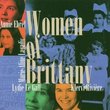


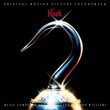
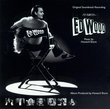
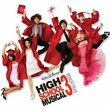

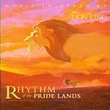
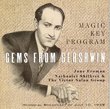
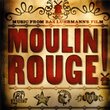
![Harry Potter and the Goblet of Fire [Original Motion Picture Soundtrack]](https://nationalbookswap.com/cd//m/35/3335/13253335.jpg)
